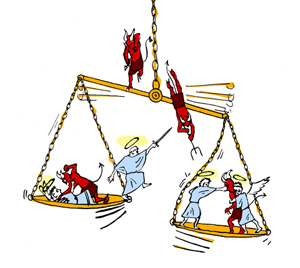
Your complimentary articles
You’ve read one of your four complimentary articles for this month.
You can read four articles free per month. To have complete access to the thousands of philosophy articles on this site, please
Books
Moral Relativism by Steven Lukes
Phil Badger surveys Steven Lukes’ perspective on moral relativism.
To begin with, let me say that this is a slim book on a huge and controversial topic. However, to say that a book is slim in girth is not to say that it is slight in content, and this one is the summation of well over thirty years work on its topic by an eminent thinker in the field. Professor Lukes’ conclusions might not be to the tastes of some readers, but few will be left with anything less than admiration for his grasp of the issues, or his crystal clarity in exploring them.
Lukes, a professor of politics and sociology at New York University, first outlines several species of relativism. For example, cognitive relativism says that there is a range of fundamentally incompatible perspectives about the sorts of things that can be true. The inspiration here is Immanuel Kant (1724-1804), and in particular, his insight that what have become known as our ‘conceptual schemes’ (not his term) shape our understanding of the world. However, Kant argued that even if we could not be sure how far our understanding revealed ultimate reality, the rational mind’s basic ‘categories’ (his term) generated a universally human vision of that reality. Cognitive relativism undermined Kant’s ‘human universalism’ by making claims, based on anthropological research, for ‘exotic’ cultural variations in both beliefs about the world and basic logic.
The Diversity of Custom

Relative Battle
© Peter Pullen 2016. Please visit www.peterpullen.com
As exciting as debates about cognitive relativism are – and there are plenty of us who’d take the ‘universalist’ side against such relativism – it is moral relativism that most interests Lukes. Again, it is the apparently huge range of beliefs found across human cultures that inspires the moral relativist move. Faced with the wide differences we find between individuals and between cultures regarding morality, the relativist abandons questions about the justification of moral beliefs in favour of sociological ones explaining why they exist. Morality, on this picture, is the product of time and place, and there is nothing more to moral approval or outrage than the cultural conditioning of emotion. For Lukes, moral relativism represents a fusion of anthropology and moral scepticism which sees genuine debate on moral issues as impossible.
Of course, the existence of moral diversity is, of itself, no argument for moral scepticism or relativism: we might, as Lukes points out, readily accept that others think differently from us and conclude that they’re just wrong! It is only when we adopt the ‘external’ perspective of the anthropologist that doubts about the status of our own moral beliefs get a hold. This is a matter of profound anxiety to some (Lukes cites Pope John Paul II as an example) on the grounds that, captured by such doubt, we’ll be unable to maintain any sense of value at all.
Sadly for the moral absolutists amongst us – and ultimately we have to count Lukes in that camp – there is more difficulty in overcoming moral relativism than its cognitive sibling. Concerning cognitive relativism we can, with moral philosopher Bernard Williams, say that reality has a habit of biting us hard if our cognitions are too wide of the mark – people with really mad thinking about the world will die a lot quicker than people with reality-tracking thoughts. Thus, agreement or ‘convergence’ on big questions of fact is at least possible.
No such constraints define the limits of moral variation. Consequently, history and anthropology give us repeated examples apparently vindicating the view of the Greek poet Pinder that “Custom is lord of all.” Lukes himself gives an excellent example from Herodotus about the mutual horror that Greeks, Persians, and Indians experienced on learning of each others’ preferred modes for disposing of the remains of the dead. It seems as that we are in the business of ‘inventing right and wrong’ (the phrase is the subtitle of a relativist tract by John Mackie).
Against Moral Relativism
Faced with this situation, the beleaguered moral realist – someone who says that there are real ethical truths independent of parochial variations in customs – has few options. One, which Lukes explores, is to deny that variation at the level of ‘norms’ (that is, rules and practices), betokens any real moral variation at all. Thus Persians, Indians, and Greeks all shared the ‘value’ – a more abstract, higher order of thing than a norm – of respecting the dead, even though the norms followed in doing so differed.
The problem here is two-fold. Firstly, the extent of normative variation between cultures makes us balk at the idea that this variation is superficial. Secondly, if the realist wants to assert the truth of one set of norms against another, her position is as untenable as moral relativism itself. Moral relativism holds practices to be too different to judge them by any one standard, whilst with moral realism, the apparent differences in practice signify no real differences at all. How can we know which perspective is true?
Well Lukes does not swallow any of this. You can almost hear his distain for anthropologists such as Richard Shweder, who attempts to categorise female circumcision as ‘genital modification’, and describes suttee (a Hindu widow’s ritual self-immolation) as “conceivable [to the victim] as an astonishing moment when her body and its senses became fully sacred.” For Shweder, and others like him, cultures and their ways are radically different, alien, and, chillingly, closed to any form of evaluation from what they see as our ‘ethnocentric’ Western perspective.

Divine Judgement? Kali Trampling Shiva by Raja Ravi Varma
Lukes argues that what is at work here is a kind of romanticism about culture, originating in the work of Johann von Herder (1744-1803) and later taken up by Johann Fichte (1762-1814), which sees each culture as a hermetically sealed ‘monolithic’ unit that “bears in itself the standard of its perfection” (Herder, Reflections on the Philosophy of the History of Mankind, 1791). In other words, cultures cannot be judged in terms of values external to them. Lukes pulls no punches in criticising this view, asserting that cultures are nothing like as rigid as it implies (he approvingly cites Mary Midgley’s image of cultures as ‘ecosystems’ which shade into one another, either across space or through time). He also says this view ignores the possibility of contention and struggle for change within a culture. As an example he cites the case of a Sicilian woman, Franca Viola, who broke a thousand-year-tradition by not only refusing to marry the man who had kidnapped and raped her, but by pressing charges against him. Later, in similar vein, Lukes notes the research of Christine Walley, whose work with Kenyan initiates of ‘genital modification’ counters Shweder’s picture of general female endorsement of the practice. Custom might, in other words, be ‘lord of all’; but some of its subjects are more willing to revolt than we’ve been led to believe.
Crossing Cultures
So powerful, argues Lukes, has the ‘monolithic model’ of culture become, that it has even infected the thought of some otherwise liberal thinkers, leading them to dismiss those who criticise practices in other cultures as ‘cultural tourists’.
Lukes acknowledges that such criticisms sometimes have force, but identifies dangers, both in certain kinds of relativist multiculturalism, and in the ‘Clash of Civilisations’ thesis put forward by the late Samuel Huntington. Both of these concepts, Lukes argues, are premised on the notion that dissent within a culture is always experienced as both negative and external in origin. Thus in Holland some well-meaning liberals have denied the need for cross community dialogue or critique, which they fear might be experienced by immigrant communities as a form of cultural imperialism, while Huntington saw only irrevocable difference between ‘civilizations’ – again negating the possibility of real dialogue between them. The net result of both positions has been a ‘ghettoising’ of culture in which a conservative suspicion of those defined as ‘other’ can fester.
Instead, Lukes proposes that we embark on a renewed effort to identify shared values across cultures – what political philosopher John Rawls called an ‘overlapping consensus’. This might, Luke hopes, form the basis of a healthy re-examination of the justice of particular cultural norms. Lukes refuses to pin his hopes for this on any specific philosophical resource, but unsurprisingly, ‘Kantian universalism’ gets a mention, as do Jürgen Habermas’s attempts to rescue the idea of shared values from what he sees as Rawls’ excessive ‘abstraction’. For Habermas, thought experiments such as Rawls’ ‘original position’, or Kant’s notions of ideal rationality can’t replace actual debate between real individuals. Lukes even gives a nod to the kind of Aristotelian view represented by Martha Nussbaum’s ‘capabilities’ approach, which holds that there are some universal prerequisites necessary for people to live fulfilled lives.
There’s much to be said on all of this. For instance, Habermas insistence on the right of ‘all concerned’ to take part in such a debate has a whiff of circularity about it – it assumes the equality of persons which he hopes will be our conclusion. Nussbaum’s position, on the other hand, might seem no more than an eloquent plea for universalising certain rights. Nevertheless, for Lukes, the chance of establishing a dialogue between cultures is worth the effort, and dialogue that moves us towards basic consensus on values is the best argument against a moral relativism which begins from the observation of apparently irreconcilable differences.
© Phil Badger 2016
Phil Badger studied social sciences, including economics, psychology, and social policy, with philosophy, and teaches in Sheffield.
• Moral Relativism by Steven Lukes, Profile 2008, £8.99 pb, 256pp, ISBN: 1846680093









